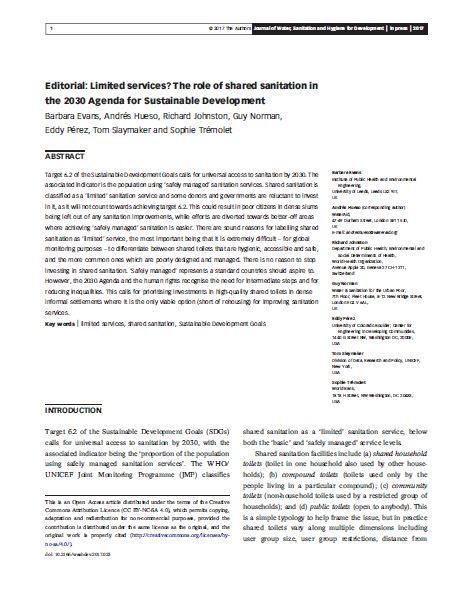Limited services? The role of shared sanitation in the 2030 Agenda for Sustainable Development
 |
article coll. IWA - Journal of Water, Sanitation and Hygiene for Development n° 7 Jul 2017 ; 3 pages
Aut. Barbara Evans & Andrés Hueso & Richard Johnston & Guy Norman &
Ed. IWA - London
Downloadable format: PdF
Downloadable from the publisher
Editor Presentation
Abstract:
Target 6.2 of the Sustainable Development Goals calls for universal access to sanitation by 2030. The associated indicator is the population using ‘safely managed’ sanitation services. Shared sanitation is classified as a ‘limited’ sanitation service and some donors and governments are reluctant to invest in it, as it will not count towards achieving target 6.2. This could result in poor citizens in dense slums being left out of any sanitation improvements, while efforts are diverted towards better-off areas where achieving ‘safely managed’ sanitation is easier. There are sound reasons for labelling shared sanitation as ‘limited’ service, the most important being that it is extremely difficult – for global monitoring purposes – to differentiate between shared toilets that are hygienic, accessible and safe, and the more common ones which are poorly designed and managed. There is no reason to stop investing in shared sanitation. ‘Safely managed’ represents a standard countries should aspire to. However, the 2030 Agenda and the human rights recognise the need for intermediate steps and for reducing inequalities. This calls for prioritising investments in high-quality shared toilets in dense informal settlements where it is the only viable option (short of rehousing) for improving sanitation services.
Publisher/Broadcaster: |
|
IWA
-
International Water Association - London - United Kingdom |
If there is a broken link, we will be pleased to receive a message: communication@pseau.org